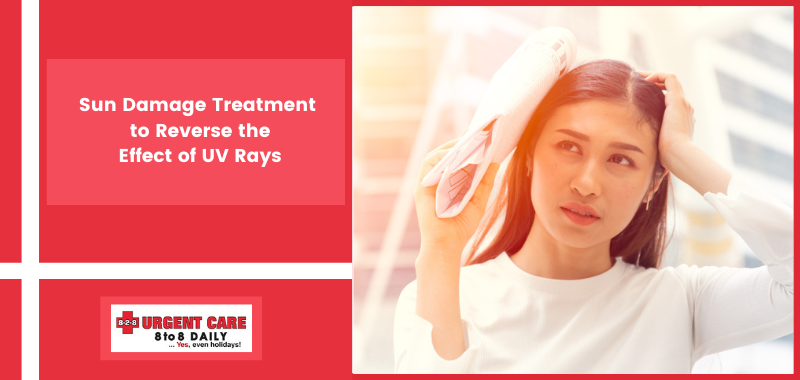


Summer is the season of beach days, poolside lounging, and endless sunshine. There's nothing quite like the sun’s warm embrace to lift your spirits and give your skin that sun-kissed glow. While we enjoy this warmth and fun, it is essential to remember the hidden risk of UV rays.
According to research, approximately 90% of skin damage is attributed to the sun and heat. This number highlights the importance of sun damage treatment. All skin experiences intrinsic aging (natural aging). External factors like UV rays accelerate this process (extrinsic aging), leading to what is known as photoaging. The adverse effects of UV radiation make it a major contributor to the premature aging of our skin. Let us learn more about UV rays and their effects to find practical treatment and prevention strategies.
UV rays are classified based on their penetration power. The shorter the wavelength, the lesser the skin damage. The following are three kinds of UV rays:
These rays penetrate deep into the skin's thickest layers called the dermis. Prolonged exposure to UVA rays can lead to long-term skin damage, including wrinkles, leathery skin, and a loss of elasticity.
These rays are primarily responsible for sunburn as they penetrate the outer layer of the skin, the epidermis. UVB rays damage the DNA in our skin cells, which can lead to skin cancers over time.
These are the most damaging effects of sun radiation. Fortunately, they are completely filtered through the atmosphere and do not reach the surface.
Understanding the types of UV rays and their penetration properties will help prevent sun-damaged skin.
Sun-damaged skin can be repaired by using treatment procedures to reduce or clear the effects of UV radiation. The process cannot reverse the sun damage permanently but can improve the overall texture, fine lines, and wrinkles on the skin. Some common treatment procedures include:
Serums containing vitamins C and E or topical retinoids with vitamin A can stimulate collagen production, improve texture, and fade sunspots.
These treatments involve applying a chemical solution to the skin, which exfoliates the damaged outer layers.
Laser treatments can target sun-damaged areas, promoting the growth of healthier skin cells.
Keeping your skin well-hydrated with a good moisturizer helps repair the skin barrier and maintain its elasticity. Try to find products with hyaluronic acid, glycerin, and ceramides.
A diet rich in antioxidants, vitamins, and minerals supports skin health from the inside out. Foods like berries, nuts, leafy greens, and fish can help repair and protect your skin.
Consult with a dermatologist or a professional to find personalized treatments for skin damage and other skin concerns.
Preventing sun damage is essential for protecting your skin from UV rays. Following simple steps like hydration routines and using the right skincare products can protect the skin from severe damage that may be irreversible. These steps can be:
UVA and UVB sunscreens (SPF 30 and above) can help protect the skin from the sun's harmful rays.
You can opt for long-sleeved shirts, pants, and wide-brimmed hats. Clothes made from tightly woven fabric offer better protection.
Avoid direct sun exposure, especially between 9 a.m. and 3 p.m., when UV rays are the strongest.
Water, snow, and sand can reflect UV rays, increasing your exposure.
Protect your eyes with sunglasses that block UV rays completely.
Long-term skin protection against UV rays not only prevents premature aging but also reduces the risk of skin cancers. Consistent use of sunscreen, protective clothing, and other preventative measures can keep your skin looking youthful and healthy for years to come.
At 8-2-8 Urgent Care, we provide expert advice when it comes to protecting your skin from UV damage. Our team of healthcare professionals is dedicated to helping you maintain healthy skin and can give specific recommendations for dermatological treatments. Contact us today, and our staff will walk you through our self-check-in from the convenience of your home! Call (760) 216-6253.
Content Sources: NIH MedlinePlus Magazine, CDC